Movie Review of Perfume: The Story of a Murderer (2006) by Tom Tykwer, Part I {Perfume/Film Review & Musings}
This is part I of my review of Perfume: The Story of a Murderer. I will devote a second part to the perfumista's point of view when watching the movie. In this first part, I offer a more general analysis of the movie.
The movie Perfume: The Story of a Murderer is both a hyper-realistic and flamboyant adaptation of the novel by Patrick Süskind initially published in 1985, a story that for a long time was famously deemed impossible to adapt by the likes of Francis Ford Coppola and Martin Scorcese. After years of tribulations, German producer Bernd Eichinger (In the Name of The Rose) succeeded in securing the rights from reclusive author Süskind, apparently convincing him that his own vision would be up to the challenge. It is reported that the German writer would have ideally liked to see Stanley Kubrick do the adaptation.
Director Tom Tykwer (Run Lola Run, a must-see) who was brought in later then had to overcome two main obstacles. First a classic one, the challenge of adapting a suspenseful thriller that had been translated in this case in 45 languages and read by millions worldwide. The second one, more daunting, more original, more creative, and more historic, that of adapting an "olfactory novel" on-screen....
After seeing the movie, the spectator feels that Tykwer has succeeded in overcoming major difficulties and even offering something personal in the course of doing this, but perhaps not in polishing out certain nevertheless significant aspects of the project, in particular the screenplay. However, I also think that the movie should be viewed bearing in mind that Tykwer is a pioneer and that pioneers open the way rather than close it and in doing so spend a vast sum of energy and creativity on the path-clearing phase.
The director has met challenges inherent to the story mainly, in my view, by relying on the charisma of his actors, adopting a provocative filmography which is both dazzling and shocking, making central use of music (co-authored by Tykwer himself) to convey the ineffable nature of scents, and finally by transforming a story that was classical in essence and more oriented towards the external and a critique of society into a more romantic one where the interiority of the main protagonist, Jean-Baptiste Grenouille, is alluded to, and an aesthetic program of sorts is developed.
The director, while offering overall a respectful adaptation of the movie which takes few significant liberties with the original story, has nevertheless managed to imprint the movie with a more personal touch. The screenplay is the result of shared vision and was written with six hands, those of Tom Tykwer, Bernd Eichinger, and Andrew Birkin.
The most puzzling aspect of the movie in terms of its form is a mixing of genres to the point where it seems almost not to work. If you expect the movie to be uniformly dark, then you will be surprised by your own reaction and that of the audience.
One way for me to understand this is to propose that Tykwer adds to the story an aesthetic of contrasts that seems interestingly enough to refer itself to the Shakespearian universe, in particular to Macbeth, and even more so, in my mind, to a Hugolian type of romanticism that Victor Hugo, the writer of the Preface to Cromwell heralding the coming of a new romantic theater, would have approved of. In thinking again about some incongruous aspects of the movie, I was suddenly irresistibly reminded of Hugo's words in that manifesto of his in which he declares that "Shakespeare is drama; and the drama, which is based on the grotesque and the sublime in the same breath, tragedy and comedy, such drama is the appropriate form for the third period of poetry, the literature of the present."
Implicit or unconscious references in the movie to, seemingly, works by Victor Hugo like Les Misérables and Notre Dame de Paris reinforce this perception.
Perfume by Tywker is a work which possesses that rough and coarse edge that one finds in both the Shakespearian and Hugolian worldviews. In the movie the sublime (the ideal perfume and its pursuit) mixes with the grotesque (the obsessive aspect of that quest, humanity in general and its many ridicules and dejections) in the same breath contributing to a strongly contrasted style of the movie to the point of appearing like a break in tone.
It does so in creating on the one hand an exquisite, romantic, and ethereal register full of beauty and contemplation of the ideal and next, a comic and even grotesque register which sends the unsuspecting audience laughing out loud. In this manner, the sometimes sarcastic humorous tone of a "conte philosophique" or philosophical tale à la Voltaire which obviously inspired Patrick Süskind's cerebral humor has been turned into a more brusque, comic, gleeful, mocking, popular and caricatural tale at times.
The spectator can be gripped by deep compassion for and understanding of Grenouille's pursuit of ideal olfactory beauty (an idea very well illustrated by the film's musical score, which the actors were able to hear while shooting their scenes, as the music had already been composed when they started filming) and next pulled out of this rêverie by Tykwer slapping the spectator on the thighs as he unleashes some buffoon element which seems to be so naive, spontaneous, and borderline out of place as to be involuntary. I can only say pay attention to Baldini's surroundings and you will see what I mean.
The movie lavishly recounts the story of Jean-Baptiste Grenouille who was born in horrific conditions in 18th century France in the middle of a hot day in the squalor of a Parisian fish market and destined by his mother to be swept away with the rotting remains of the day. Fate has it that the infant survives, holding on to dear life that he already smells vividly (as infants do in general by the way, who recognize their mothers by their smells), sending instead his mother to the gallows. He later proves to be an olfactory genius endowed with a nearly supernatural sense of smell, a trait which will lead him to near resurrection from predictable death at the tannery where he slaves away since his childhood but will also assure his own damnation and final demise as his gift pushes him to seek the ultimate fragrance. In the unfolding of his destiny that starts and ends in a closed circle in the same dantesque conditions near the Cemetery of the Innocents in Paris, the character has the time to catch glimpses of absolute olfactory beauty and absolute power over men until his own inhuman sense of solitude expressed through the metaphor of a lack of human odor finally takes over and inspires one last creative/destructive act on his part.
Süskind compared Grenouille in the novel to such disturbing "evil geniuses" as "...Sade, Saint-Just, Fouché, Bonaparte, etc...." Grenouille, we are told, was forgotten only because his talent had to do with the realm of scents, one that leaves not traces in history. Tykwer himself compares Grenouille, arguably, to Adolf Hitler. Like Hitler, Grenouille had an inhuman childhood, like him he looks puny and frail, like him he has one master intuition and knowledge of mankind that enables him to control their collective psyche.
In a critical scene of mass orgy which is the culminating point of Grenouille's career when he reveals what powers of manipulation can be contained in a perfume flask comes the revelation of his genius. That very day, he experiences a moment of super human triumph and mass adoration while his worshippers experience religious and erotic ecstasy with facial and bodily expressions reminiscent in their intensity and ambiguity of the sculptures by Gian Lorenzo Bernini like the Pieta and the Ecstasy of Saint Theresa. Someone who is not a perfumista even told me that it made her want almost desperately to experience what that divine scent was and it occurred to me that Tykwer could make spectators believe in the possibility of the existence of that scent.
The director revealed in a recent interview that he actually followed the model of a pop star concert however, acknowledging at the same time the influence of mid-20th century German history on his outlook. That scene is crucial and probably the height of the movie. It is reminiscent to me of a spectacular ritual filmed in the movie Baraka as well as of the famous scenes of Nazi mass mobilization shot by Leni Riefenstahl in Triumph of the Will.
To go back to the artistic choices made by the movie, one can say that it bears the hallmarks of a mainstream production, yet also presents less predictable features.
Tykwer shows his desire to adapt to a mainstream audience by making a substantive change in the beginning of the movie, in another key episode of the novel where Grenouille picks up on the most exquisite and elusive scent trail he's ever experienced in Paris. It leads him to follow the invisible perfumed whisper in street after street until he arrives to its originating point, a young woman cutting yellow plums. In the movie Grenouille more prosaically follows the young woman in question making it less of a stretch of the imagination to understand he is following her scent. Tykwer's cautiousness however disappears later on in the film in scenes where we are shown Grenouille's uncanny ability to detect the goings of Mme Arnulfi and her lover Druot behind the widow's house's walls or the escape route taken by his prey Laure. It does not feel like it was necessary to "prepare" the audience and simplify that inaugural episode and, an artistic opportunity was lost in my view, but somehow this is the choice that was made.
One of the less conventional aspects of the movie is an acute level of realism and even naturalism that is surprisingly non-PC. That attempt to catch the unbearable visual detail and offer it raw to the spectator is sometimes terrifying as in the scene of Grenouille's mother giving birth. The movie shows a series of jarring macro close ups of biological excretions and matter. We are in those moments reminded of the carefully cultivated shocking filmography of the surrealist short by Luis Bunuel, Un Chien Andalou (1939), in which a woman's eye is cut with a razor and donkeys rot in a piano. It is also reminiscent of the carefully filmed decomposing objects of the natural world in A Zed and Two Noughts by Peter Greenaway (1985). Alternatively, some will recognize effects abundantly used in the TV series CSI, which makes me think that today's audience might possibly feel more blasé about the forensic aspects of the movie.
Tykwer usually suggests the intensity of the smelling experience either by focusing on the bodily and facial expressions of the persons who are smelling or by offering macro shots of the objects, mostly those smelled by Grenouille, which can run from wet stones covered with tadpoles in the bed of a river to the definitely less palatable putrefying insides of a dead rat swarming with fat white worms.
The film's pull rests in great part, in my view, on the performances of two of its actors. Those are Ben Whishaw who plays Grenouille and Dustin Hoffman who has a less prominent role as the aging perfumer Baldini, but whose performance is so compelling that the movie is worth seeing if only to get to see his interpretation.The choice of Ben Whishaw to play the part of Jean-Baptiste Grenouille who in the novel evolves from being ugly to disfigured seemed counter-intuitive at first, and initially I thought it would be an unconvincing choice based on his clean boyish look. Despite the fact that he even manages to look somewhat angelic at times in the film, he proves to be one of the two strongest acting points of the movie, next to Dustin Hoffman. The young British actor brings an intensity and a vulnerability to the character that are immediately perceptible and convincing. Tykwer, like Jonathan Demme in The Silence of the Lambs before him, thus manages to make the spectator be more touched by an amoral monster, Grenouille, than by the innocent but dull Druot who is finally hanged in his place.
Alan Rickman although good I found was less giving of himself as he is usually as he appeared less strange, complex and projected less interiority than usual, being more rigid-looking and conventional in his role as the protective father of Laure Richis. Rachel Hurd-Wood who is only 15 is quite good at conveying the image of a beautiful child and nascent woman whose face has of yet no history to tell and is a passive victim to forces she hardly understands or even fears.
The non-harmonious character of the film I already referred to comes in part from drastic changes in the registers of the movie. For example there is a scene where Baldini after having smelled an out-of the-world perfume creation by Grenouille, which he dubs "Nuits Napolitaines" imagines he is in Napoli with a young woman. In the hands of Tykwer that passage becomes something like a TV ad and when the Napolitan girl approaches the perfumer to kiss him and opens her mouth to croon "I love you" the whole audience in Boston burst into laughter because of the caricatural aspect of the scene and the recognition of a stereotypical theme and style borrowed from advertising culture.
Another example is the orgy scene, which is at once fascinating and comic and here again the audience reacts with hearty laughter. The movie is both highbrow and lowbrow both refined and coarse, terrifying and laughable.
Next to these stylistic choices, there is also an uneveness in the movie that is more technical and stems from some of the less rigorously filmed scenes in the movie. These problems are more systematically linked to the screenplay. In certain passages of the film Tykwer seems to be taking a break from consistency and continuity and drawing some doodles to amuse himself and experiment.
The screenplay offers a nice fast-paced rhythm, which is efficacious in overcoming potential attention fatigue from the readers of Perfume since they are dealing with predictability. However, sometimes in Tykwer's efforts to add new details that are not in the novel, we are offered several times incongruous, somewhat confusing, and unrealistic scenes. For example, we see Richis' daughter Laure suddenly without transition dressed in a peasant garb dancing amongst a group of simple folk men - seemingly to show off her seductive power - on the street in the night by a bonfire as if she were another Esmeralda dancing in the square in front of Notre Dame de Paris. It took me a couple of seconds to realize that the redheaded actress that looked like Laure was indeed her as it seemed really out of character. There are also the less than convincing additions of the characters of a prostitute and two twin sisters. The first one is confusing - as Grenouille is supposed to be only interested by the scents of virgins - and seems too dependent on a whore-virgin dichotomy that ultimately feels artificial. The addition of the twins motif even manages to create a stronger reaction of disbelief in the spectator who starts wondering how Grenouille could have realistically managed to do what he did and get away with it.
The movie is striking and because of that some aspects of it appear less so. The dialogues are smooth but not stellar as some of the acting or the filmography are. The use of a certain class-coded British English in the movie appears also sometimes a bit quaint and involuntarily décalé as it starts evoking London and England. Personally I thought that the narrator's voice was distracting rather than engrossing (by contrast I find Cate Blanchett's narrating voice in Lord of the Rings very engrossing).
Ultimately, these strongly contrasted and uneven elements create the perception that there are moments - rather than the whole movie itself - that are prize-winning cinematic pieces. There would be a prize for best supporting actor (Dustin Hoffman), best actor/young talent, best decor, best props, best visual effects, best ensemble cast (the collective frenzy scene), most effective use of film music, and best movie adaptation (in recognition of the difficulty of the project). There are also other scenes about which one is uncertain what to think of, and still others that seem to go too far in the direction of playful experimenting as they seem to be constrained by nothing but fantasy and appear whimsical.
Tykwer, interestingly, also proposes certain personal interpretations of the story by Süskind as for example Grenouille's capacity to conceive of love and the role of free will in his life, which are not to be found in the novel. In the novel it is clear that Grenouille cannot love and is not interested by love and his behavior is obsessive. In the movie Tykwer suggests that Grenouille could have loved the young woman with the yellow plums instead of doing away with her. This is suggested in a very short and romantic love scene lived in imagination by Grenouille. The film thus breaks for a moment the asexual image of Grenouille that is prevalent in the novel and it seems that some people in the audience thought that the Grenouille in the movie in fact did fall in love with his first victim.
The reader-turned-spectator mostly feels the book is coming alive in front of his or her eyes and is intrigued by some of the ideas introduced by Tykwer. The visuals in general are spectacular. Personally I know that I will be buying the DVD when it comes out just to be able to re-watch Dustin Hoffman's performance and the many nuances displayed on his face as Baldini. Some moments of the movie are pieces of anthology and you will have to have seen them to be able to converse about cinema, I think. Again, like Hugo, the movie is powerful, contrasted, and at times, uneven, taking the creative liberty to experiment rather than polish and conclude.
The movie will have a limited release on December 27th 2006 before being widely distributed on January 5th 2007 according to Movies Online.







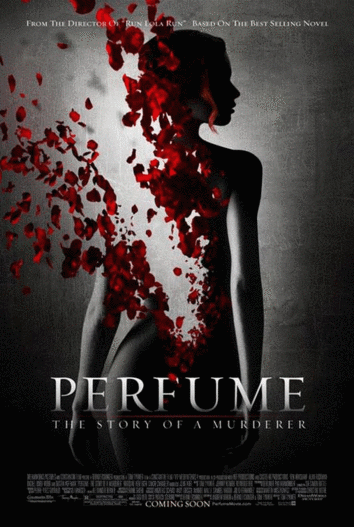
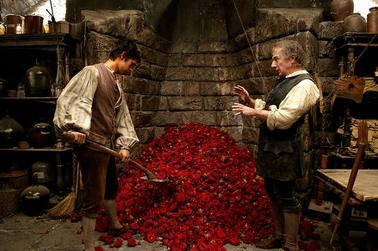
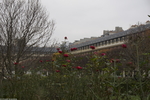
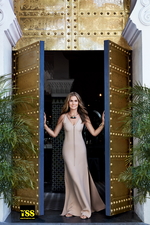
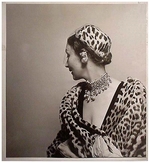
My god, Hélène, this review is absolutely brilliant! You have such an amazing flair for capturing the essence and a great eye for detail, too. Every aspect of the film that has been intriguing me ever since I first heard of it you've managed to convey with such vividness and lucidity that I now feel an even stronger desire to finally see it. At some points your train of thought and musings were very much like my own, which sent me laughing and shuddering at the same time. I couldn't agree more on the incogruousness of the narrator's voice and diction a more attentive reader-turned-spectator might experience while watching the film because I feel the same way as you regarding C. Blanchette's (whom I ADORE) awe-inspiring narration in LOTR.
With bated breath I am looking forward to part 2 of the review and, please, give us more of these splendid accounts! *claps hands* :-)
Dear Helene,
This is one of your most substantial articles and I really appreciated your insights. I noted the similarity of the novel to Notre Dame de Paris so I will be interested to view the film with your theory in mind and respond to your multifarious critique. Thank you.
Cait
Hi Dusan,
Many, many thanks for your comments, I really appreciate it.
I wished I could take more time from time to time to write more developed posts but if I did I wouldn't be able to post as often.
I love cinema so it was a real pleasure to delve into the subject for once...or twice:)
Dear Cait,
Thank you very much for your kind words. This Hugolian aspect to me is very intriguing because it is done in a both very faithful and personal manner by Tykwer. I feel a little bit as if this film was directed for an audience from a different century. It feels very authentic and a bit strange at the same time. A word that I heard at the end of the movie when some people were asked about their feelings about the movie was reflexive silence followed by a contemplative "weird". I must say that the atmosphere around the movie was a bit unusual.
This has to be one of the most detailed reviews I've seen yet it has me intrigued. I am definalty excited about this movie.
Cecil,
Glad you found the review was helpful. There is certainly a lot to discuss about in this movie, especially if you have read the novel. Hope you enjoy the film.
Dear Sir,
It is our pleasure to introduce ourselves, as one of the main producer of Herb Distillate and Essential Oil and Dried Rose,Fruit juice and concentrate in Iran as like as:
Essential Oil:
Rose Oil, Dill Oil, Cumin Oil,Eucalyptus Oil,Spearmint Oil, Geranium Oil,Thyme Oil, Orange Oil,Lemon Oil,Fennel Oil,Juniper Oil,Pepper Mint Oil ,Tarragon Oil,Coriander Oil,Savory Oil,Basil Oil ,Galbanum,pomegranate seed oil,pomegranate fruit concentrate, fruit juice
Herbs Distillate:
Rose Water,Cameleum Water,Chicony Water,Cumin Water,Fennel Water,Dill Water Mint Water,Salix Egyption Water,Dog Rose Water,Orange flower Water, Fumitory Water
Dried Rose:
Rose Bud, Rose peta (fragment) ,and saffron
As you are aware our products are one of the raw edible material for chocolate industry,dairy industry,food industry in general and sanitry service such as cosmetics and detergent and medicinal group(to make ointment or syrup and etc…).
So, we are interested in expanding our mutual buisness relationship, in order to provide our products for your esteemed company with the highest quality and competitive prices for your annual orders.
Please be so kind as to send us a short notation of your interested in our services.
B.regards,
Export Manager
Sheedeh Mohsenzadegan(Mrs)
E-mail: ghatrangol@accir.com
Tel No.: 0098-21-8706097-6
Fax No.: 0098-21-8716378
Address:First Flat,Nikan Building,,No.3,15th street,Vozara Avenue,Tehran-Iran
M-H, may I add my admiration for your gift of writing to that of the other posters. You have an incredible gift for description, which we have already admired in your reviews of perfumes. One can practically smell the scent you are describing.
I read Perfume a long time ago and was captured by the book. Among other things, because it echoed my secret desire to create THE ultimate perfume (without the unfortunate consequences Mr. Grenouille's concontion brought on, I hope).
I look forward to seeing the film, although I know that I will be quite put off by several scenes (I have a queasy stomach, I'm afraid). Thanks again for a stupendous article.
Ever thought of writing a book? The subject is immaterial. With your gift for writing, anything you choose to write about would be worth reading.
Huh, Jim your comment is very embarrassing to me, but I don't want you to think I don't appreciate your support.
I am not saying anything at this point:)
this is brilliant...the most thorough review i've ever read...and some more you said it was the first part..this is really good...point out a very stong point of the movie
Thank you very much for your kind words -- I did want to write a part II focusing on how all-things perfume and olfactory are represented in the movie. I believe I have a draft of that...